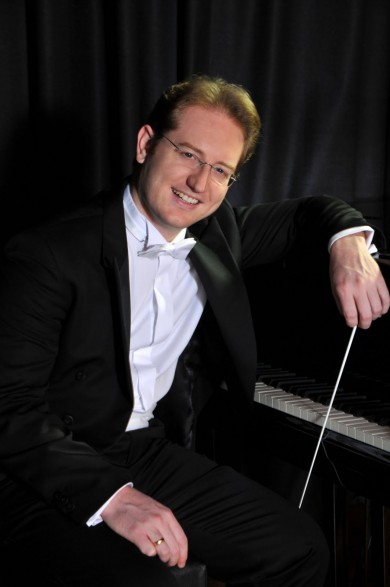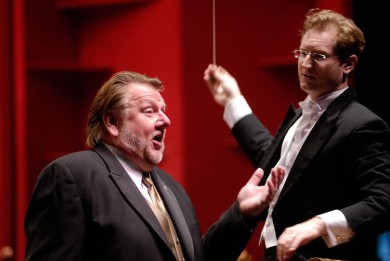FGO’s new conductor brings his meticulous spontaneity to Puccini’s “Rondine”

Ramon Tebar will conduct his first performances as FGO music director beginning Saturday night in Puccini's "La Rondine."
The glamour of another opening night at Florida Grand Opera originates in a gray warehouse district of Doral, with noisy flyovers by planes approaching Miami International Airport.
The company’s cavernous rehearsal space exists in a long industrial building with exposed girders and ventilation ducts, looking like a Home Depot apart from the racks of costumes inspired by medieval Lombardy and 19th century Paris. Amid elegant furniture scattered around the space, sopranos, tenors and baritones in street clothes, wielding cigarette holders and champagne glasses, attempt to create the ambiance of a fashionable Parisian salon.
Presiding over the rehearsal is Ramon Tebar, the young Spanish conductor who will make his debut as the company’s new music director Saturday night in Puccini’s La Rondine. Everyone calls this genial but businesslike 33-year-old “maestro.” Wearing rimless glasses, and clad in black jeans and a dark sport coat, Tebar looks like a corporate lawyer on his day off. His style is an effective blend of the nerdily meticulous — his copy of the score is highlighted in four colors and festive with Post-It notes — and let-it-all-hang-out spontaneity. He constantly presses the singers to sound less rehearsed and more edgy.
“I know you have sung this aria one hundred times, but the public should feel you’re improvising now,” he told one of the singers. “The specifics every day will be different. I hope it’s not perfect. We are not machines.”
Tebar takes over FGO at a time when the company appears to be emerging from an extended artistic slump marked by mediocre orchestral playing, amateurish stage direction and singing that often ranged wildly from excellent to deplorable.
Perhaps, most of all, the company seemed handicapped by the conducting of former music director Stewart Roberston, which was frequently cited in reviews for slack, undisciplined ensemble and a lack of vitality and dramatic intensity.
Over the past two years, FGO’s productions have shown a marked improvement, particularly in the pit, where new personnel has revitalized the orchestra. Two of the best recent performances came when Tebar served as guest conductor, leading exciting, sensitively wrought productions of Donizetti’s Lucia di Lammermoor and Puccini’s Turandot.
Robert Heuer, general director of FGO, was looking for a replacement for Robertson, music director since 1998, whose contract was allowed to expire in 2010. A few days after the well-received Turandot premiere, Heuer invited Tebar to lunch and offered him the job.
Heuer said he had been considering this step for a long time. “I was very impressed with what he did with Lucia,” he said. “The singers, orchestra and chorus responded really well and indicated how much they enjoyed working with him. The fact that he has a career in Europe as well as here means he’s working with singers we wouldn’t necessarily find out about. It certainly is a plus to have someone who’s Hispanic.”
Tebar will make his debut this Saturday as FGO music director in one of Puccini’s least-often-performed operas, a work famously dismissed by one critic as “the afternoon off of a genius.” Rondine has its flaws, feeling like an uneasy mix of operetta and opera, with a wisp of a plot that strongly resembles that of La Traviata. It has fewer show-stopping arias than the more popular Puccini works and an ending that’s more depressing than tragic.
But anyone who loves the melodies, orchestral colors and pathos of La Bohème or Madama Butterfly will hear much to appreciate in La Rondine, a work that deserves to be heard much more frequently than it is. The opera tells the story of the beautiful but world-weary Parisian hostess Magda, who sees in a young man just arrived from the country a chance to recapture the romantic magic of her youth. The scene shifts from her salon in Paris to the glittery nightclub Bullier’s to a summer house on the French Riviera. Things, needless to say, do not go smoothly, but no one is stabbed, no one is shot, no one swears that she will meet her tormentor in front of God before leaping from the Castel Sant’Angelo.
“The drama is better in Madama Butterfly, Tosca, in La Bohème than La Rondine,” Tebar said. “It’s like everyday life. At the end, it’s about a relationship that breaks up and she leaves him. it’s very simple, you know, it happens every day. What doesn’t happen every day is that Tosca jumps from a tower. It happens, of course, but not in the same quantity.”
Adds Heuer, “I think every opera company wishes there were more Puccini operas because they sell tickets. I think this is one the public will respond to.”
So rarely heard is La Rondine that Tebar, a man who has worked in opera most of his life, never got to know it except for a few arias. To prepare for this assignment, he did what he typically does with opera: he listened to the oldest recordings he could find.
Tebar wanted to sweep away the performances practices, the traditions that encrust operas as singers imitate past singers, as he tried to find both the composer’s intentions and ways to make the opera come alive on stage. In old Italian recordings from the 1930s, ’40s and ’50s he found a different Puccini than the obvious, ticket-selling tear-jerker of the contemporary opera stage.
“In these old recordings you have a sense of a different Puccini, in the tempi, in the nuances,” he said. “I think that our approach [today] to Puccini is too romantic. You go, for example, to listen to Toscanini with the NBC Orchestra in La Bohème, you see the difference. I hope that I’m closer to the composer than the tradition.”
Tebar spent solitary hours studying the orchestral and vocal parts. Elizabeth Caballero, the soprano who will sing the leading role of Magda, said she was amazed by Tebar’s obvious mastery of a score that he had not known before this assignment. “I find it very impressive that he knows the entire book from memory,” she said. “He hardly looks down at the score.”
This facility with the score allows Tebar to focus on making the music both faithful to Puccini’s intentions while avoiding drilled, museum-piece perfection. “We should be prepared to look like we would be improvising because this way the music becomes more alive, every ritardando, every rallentando, every phrase. In La Rondine in the first act, there is this party, and Magda is improvising this poetry. If we rehearse too much, then everything is too perfect. It should be different every night, like life.”

Ramon Tebar conducting a concert with tenor Ben Heppner at the 2009 Santa Domingo Music Festival.
Like many conductors, Tebar started out as a pianist. He entered the music conservatory in his hometown of Valencia, on Spain’s Mediterranean coast, as a child. Although he made rapid progress, he discovered conducting at 15 and took to it instantly. Before graduating from the conservatory he had conducted symphonic concerts and opera.
He also found he was gifted at accompanying singers and became one of the favorite pianists of the renowned Spanish soprano Montserrat Caballé. During master classes at Rome’s Accademia Nazionale di Santa Cecilia he caught the attention of Bruno Aprea, the highly respected music director of Palm Beach Opera.
Tebar became assistant conductor at Palm Beach Opera but lacked enough opportunities to conduct, except for engagements in Europe. Daniel Biaggi, the company’s general director, recommended him to his counterpart at FGO, who gave him a try with Lucia. In the meantime, Tebar established himself as a sought-after guest conductor, leading concerts and operas in prestigious houses in Mexico, Italy and his native Spain, and with singers such as Ben Heppner, Plácido Domingo and Dawn Upshaw. In addition to leading Florida Grand Opera, Tebar is music director of the Palm Beach Symphony and associate conductor of the Santo Domingo Festival in the Dominican Republic.
Today his career is an odd blend of the regional and world-class. This year, as guest conductor of the Boca Raton Symphonia, he will lead the orchestra at a concert at the St. Andrews School. He will also lead the Palm Beach Symphony at Bethesda-by-the-Sea Episcopal Church and other venues. While tending these local orchestras, he will engage in the career of a jet-setting maestro. Tebar will fly to Buenos Aires to lead a performance by opera’s glamour couple, Angela Gheorghiu and Roberto Alagna, at the Teatro Colón, one of the world’s legendary opera houses. He will also conduct performances of Tosca in Spain, and jet to Japan to conduct Tosca, Cavalleria Rusticana and Pagliacci.
Despite his travels, Tebar has established strong roots in South Florida. He lives in Aventura with his wife Veronica, a native of Venezuela. They have a one-year-old daughter and are expecting another baby in April. “Miami’s a very special city to me because the first time that I arrived here in the U.S. I arrived in Miami airport, I met my wife here in Miami I married her here,” he said. “My daughter was born at Mercy Hospital here in Miami.”
Tebar doesn’t have plans to revamp FGO. He wishes he could do as many productions as European companies but there’s nothing he can do about that. He won’t reveal the titles under consideration for next season but said he hopes at least one will be an opera never before heard in South Florida.
One project particularly excites him: the company was awarded a Knight Foundation grant to perform opera in unusual places as a way to broaden its audience. “We have to perform operas in more informal ways,” he said. “I think we have to break these prejudices people have that opera is just for elites or just for rich people or just for old people.”
Florida Grand Opera’s production of Puccini’s La Rondine opens 7 p.m. Saturday and runs through Feb. 4 at the Arsht Center for the Performing Arts in Miami. fgo.org; 800-741-1010
Posted in Articles
Leave a Comment
Thu Jan 19, 2012
at 12:02 pm
No Comments